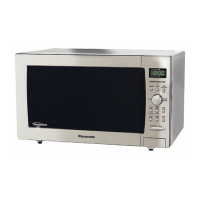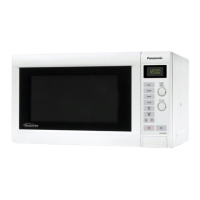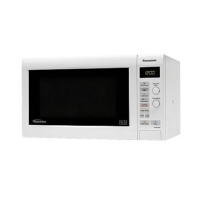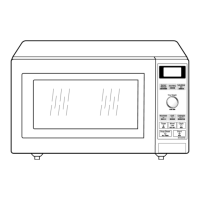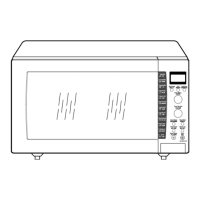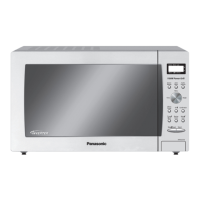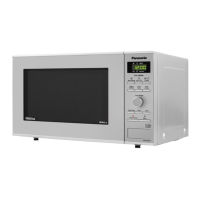Do you have a question about the Panasonic NN-GD566 and is the answer not in the manual?
Lists metric and imperial weight conversions for recipes.
Lists metric and imperial capacity conversions for recipes.
Provides key information about oven wattage and heating category.
Shows the symbol indicating the oven's heating category.
Contact details for obtaining cooking advice and support.
Address for customer care and product support inquiries.
Details on mains lead wiring colours and connection requirements for safety.
Information on using the correct voltage and power for safe operation.
Warnings about hot surfaces during operation and precautions for children.
Instruction to keep the receipt as proof of guarantee.
Advice on handling a damaged supply cord and replacement procedures.
Note regarding inspection of door seals for damage before operation.
Guidelines for oven placement on a counter-top for proper airflow and safety.
A direct instruction not to use the oven outdoors.
Warning about hot surfaces during Grilling/Combination cooking.
Advice on storing accessories safely inside the oven.
Initial setup procedure for combination or grill functions.
Warning about hot grill element and oven after initial use.
Crucial warning against operating the oven without food.
Information on when and how to obtain service for the oven.
Instructions on maintaining and cleaning door seals for safety.
Information on oven light replacement by a technician.
How to order spare parts and accessories.
Cleaning instructions for the control panel.
Explanation for steam accumulation around the oven door.
Guidance on cleaning the glass turntable and roller ring.
Advice on cleaning grease to prevent smoke during cooking.
Importance and cleaning of the roller ring for smooth operation.
Note on the door safety lock system and its function.
Reference to the Panacrunch Pan and its handle for specific cooking modes.
Visual reference to the oven window.
Visual reference to the external air vents.
Visual reference to the menu label.
Visual reference to the grill elements.
Visual reference to the microwave feed guide.
Visual reference to the control panel.
Visual reference to the identification plate.
Explanation of how to open the oven door.
Instructions for handling smoke or fire incidents within the oven.
Advice on managing short cooking times to prevent overcooking or burning.
Warning about exceeding cooking times leading to spoilage or fire.
Caution regarding heating small food quantities that can burn easily.
Warning about foods like bread and pastries that can burn easily.
Caution for foods high in fat/sugar that must not be over-heated.
Warning against microwaving eggs in shells due to explosion risk.
Instruction to pierce foods with non-porous skins to prevent bursting.
Safety precautions for heating liquids to prevent boil-overs.
Warning to remove lids from containers to prevent explosion risks.
Prohibition against deep fat frying in the microwave.
Key notes on cooking, metal utensils, and unsuitable foods for microwave-only cooking.
Lists foods that should not be cooked solely by microwave.
Warning about microwaving boiled eggs due to explosion risk.
Explanation of standing time and its importance for conduction cooking.
Detailed explanation of standing times for various food types.
Instruction to pierce foods to allow steam escape and prevent bursting.
Factors affecting moisture content and cooking times for fresh foods.
Guidelines for using cling film for covering food, including piercing.
A test to determine if a container is suitable for microwave cooking.
A guide to suitable utensils for microwave and grill cooking.
Guidelines for using oven glass dishes, including what to avoid.
Guidelines for using china and ceramic dishes, including what to avoid.
Suitability of pottery and earthenware dishes for microwave use.
Warnings and guidelines for using foil/metal containers, especially for reheating.
Description of the display window function.
Explanation of the microwave power setting control.
Function of the Turbo Reheat button for increased power.
Explanation of the grill settings and their selection.
Function of the Combination cooking button.
Overview of automatic defrost programs based on food weight.
Use of the Delay/Stand pad for timing programs or standing time.
How to set the clock using the clock pad and dial.
Function of the pound/ounce conversion button.
How to select Auto Cook programs using the dial.
Dial for setting cooking time or food weight.
Function of the Stop/Cancel button for clearing or pausing instructions.
How to start the cooking program with the Start button.
Explanation of the oven's beep sounds for settings and completion.
Initial step to plug the oven into a power socket.
Instruction to set the clock using the Time/Weight Dial.
Procedure for burning off rust protection oil for specific models.
How to enter cooking time using the Time/Weight Dial.
Instruction to press Start to begin the cooking program.
How to activate demonstration mode for experimenting with programs.
Instructions on how to activate and deactivate the child lock facility.
Step to initiate clock setting by pressing the Clock pad.
How to use the dial to set the clock time in 1 or 10-minute steps.
Final step to lock the set time into the display.
Overview of microwave power levels and how to select them.
Details on the 6 available power levels and their wattage.
Explanation of the Delay/Stand pad for timing programs and standing time.
Steps to set a standing time after a cooking program.
Steps to set a delayed start time for a cooking program.
Notes regarding door opening during delay/stand and auto guide system.
Importance of using the glass turntable and avoiding metal accessories.
Instructions for two-stage cooking with different power levels and times.
Instructions for three-stage cooking with delay functions.
Lists programs for auto weight defrost.
Specifies weight ranges for each defrost program.
Lists suitable foods for each auto weight defrost program.
Guidelines for defrosting bread items, including standing time and program suitability.
Instructions for defrosting meat items, emphasizing breaking up and turning.
Guidance for defrosting meat joints and chickens, including shielding.
Key tips for successful defrosting, including checking, turning, and shielding.
Importance of checking food progress during defrosting.
Note that covering food during defrosting is not required.
Instruction to turn or stir food, especially when the oven beeps.
Advice on breaking up or separating small meat items.
Explanation of shielding to prevent food from cooking.
Importance of allowing standing time for thawing.
Defrosting times and methods for various meat types.
Defrosting times and methods for different types of fish.
Defrosting information for general food items like bread and pastry.
Details the three grill settings: High, Medium, and Low.
Important safety warnings regarding the grill rack, oven gloves, and hot surfaces.
Mentions the three grill settings applicable to combination cooking.
Safety warnings about using the grill rack, oven gloves, and hot surfaces.
Explanation of the Panacrunch Pan's function for browning and crisping food.
Step-by-step guide for manual operation of the Panacrunch Pan.
Important notes and precautions for using the Panacrunch Pan.
Instructions on how to clean and care for the Panacrunch Pan.
Reference to auto programs for the Panacrunch Pan.
General guidelines for using the Auto Weight Programs effectively.
Table of weight ranges for auto programs on specific models.
Program details for reheating chilled curry.
Program details for reheating chilled Chinese meals.
Note about programs not suitable for stirring foods.
Program details for cooking fresh vegetables.
Program details for cooking fresh fish.
Symbol indicating microwave-only cooking mode.
Symbol indicating combination cooking mode.
Program for cooking jacket potatoes using the Panacrunch Pan.
Program for cooking frozen potato products suitable for grilling.
Program for reheating chilled pizza using the Panacrunch Pan.
Program for reheating frozen pizza using the Panacrunch Pan.
Program for reheating chilled pastry items using the Panacrunch Pan.
Program for reheating chilled quiche using the Panacrunch Pan.
Program details for reheating chilled curry.
Program details for reheating chilled Chinese meals.
Note about programs not suitable for stirring foods.
Program details for cooking fresh vegetables.
Program details for cooking fresh fish.
Symbol indicating microwave-only cooking mode.
Symbol indicating combination cooking mode.
Warning about overheating mince pies due to high fat content.
Caution when reheating Christmas puddings and liquids.
Specific safety instructions for reheating baby bottles.
Explanation of the oven's heating category label.
Reminder to check food temperature and allow standing time.
Cooking guidelines for frozen bread products.
Cooking guidelines for raw bacon.
Cooking guidelines for beans and pulses.
Cooking guidelines for raw beef joints, including safety.
Cooking guidelines for raw chicken, including safety.
Cooking guidelines for chilled beef burgers.
Cooking guidelines for frozen beef burgers.
Reminder to check food temperature and allow standing time.
Guidelines for increasing recipe quantities and adjusting cooking times.
Guidelines for decreasing recipe quantities and adjusting cooking times.
Recipe for aubergine with creamy mushroom sauce.
Recipe for coarse pork pâtés.
Recipe for creamy cod and leek chowder.
How to tell when fish is cooked.
Tips on arranging fish fillets and steaks for cooking.
Advice on adding liquid for cooking fish, especially frozen fish.
Explanation of popping sounds during cooking of oily fish.
Guidelines for cooking whole fish, including shielding.
Recipe for stuffed citrus trout.
General guidelines for cooking meat and poultry.
Advice on defrosting joints of meat before cooking.
How fat affects microwave cooking and choice of joints.
Importance of standing time for meat and poultry after cooking.
Advice on shielding bone tips on meat to prevent overcooking.
Instruction to turn joints and poultry halfway through cooking.
Guidance on shielding meat with foil to avoid overcooking.
Steps for roasting a joint using combination cooking.
Steps for roasting a joint using microwave cooking.
How to use roasting bags for cooking meat.
Tips for cooking small meat cuts in the microwave.
General tips for cooking meat and poultry, including crispy bacon.
Recipe for pesto spaghetti.
Recipe for lemon and asparagus risotto.
Recipe for lentil biryani.
Instruction to pierce eggs to prevent exploding.
Warning against microwaving boiled eggs.
Advice to cook quiches on SIMMER power.
Recipe for Swiss cheese fondue.
Recipe for ciabatta with scrambled eggs.
Recipe for French bread pizza.
Guidelines for preparing root vegetables.
Instructions for preparing cabbage.
Water requirements for fresh vegetables.
Advice on cooking potatoes with other vegetables.
Guidelines for choosing dishes and covering vegetables.
Arranging vegetables for even cooking.
Guidelines for cooking jacket potatoes.
Steps before cooking jacket potatoes.
Steps after cooking jacket potatoes.
Recipe for steamed suet sponge pudding.
Recipe for creme caramel.
Recipe for date puddings and butterscotch sauce.
Importance of ring moulds for baking cakes.
Notes on the short keeping quality of microwave-baked cakes.
How microwave cakes should have a softer consistency.
Instruction not to cover cakes when baking.
Importance of using specified dish sizes for baking.
Guidelines on mixing and beating ingredients for cakes.
Note on using medium eggs for testing recipes.
Recipe for sponge cake.
Recipe for carrot cake.
Method for sterilizing jam jars using the microwave.
Advice on using large pyrex bowls for preserves.
Warning about not leaving jams unattended due to high sugar content.
Instruction not to cover preserves during cooking.
Specific instruction about baby bottles.
Method for testing the setting point of jam or marmalade.
Recipe for soft fruit jam.
Addresses TV interference caused by microwave operation.
Explains why warm air is emitted from the oven vents.
Guidelines for safely installing the microwave oven into kitchen cabinetry.
Electrical specifications of the microwave oven.
Operating frequency of the microwave oven.
Input power consumption of the microwave oven.
Microwave and grill output power ratings.
External dimensions of the microwave oven.
Internal dimensions of the microwave oven cavity.
Weight of the microwave oven.
Information for business users on discarding equipment.
Disposal information for countries outside the EU.
| Capacity | 27 L |
|---|---|
| Inverter | Yes |
| Turntable | Yes |
| Turntable Diameter | 315 mm |
| Color | Silver |
| Auto Cook Menu | Yes |
| Child Lock | Yes |
| Type | Microwave Oven |
| Cooking Modes | Grill, Microwave |
